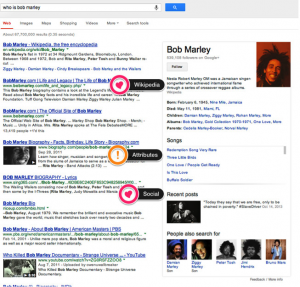30
How Google uses the Entity Relationship Model
Table of Contents
Computer science has for long made extensive use of “entities” and “relationships” for defining different data sets and key rules that govern their associations. Now, SEO and content writing professionals too may have to learn a thing or two about these concepts.
Let’s go through the basics first.
What is An Entity?
Something that can exist independently in its entirety can be termed as an entity.
So, your name is an entity and so is the title of this post. Any noun you can think of can be an entity.
What is a Relationship?
Multiple entities can be related to each other. These associations are known as ‘relationships.’
What is entity relationship model?
A Sample Entity-Relationship Diagram

While ‘Writer,’ ‘Consumer’ and ‘Novel’ are entities here, they are related to each other through relationships named ‘Creates,’ and ‘Buys.’
This simple concept, enriched by “roles” and “cardinalities” forms the basis of Relationship Database Management Systems (RDMS).
What’s in it For SEO Experts?
If you are an SEO expert, you may now need to get into the basics of how relational database systems work or how you can use ER diagrams.
What should be of interest is the fact that Google has recently secured a patent that revolves around such entities.
In this case, Google has used the term “search entities.”
The Internet is growing bigger and search engine giants, well, smarter. The next big thing happening after Hummingbird, it seems, is Google taking “search entities” quite seriously.
Google’s Knowledge Graph, for example, is in fact an “entity graph.”
In near future, Google may use the “search entities” to a great extent to correlate different pieces of information that otherwise appear disconnected to a bot.
It’s Not a Recent Development
Google has been of course trying harder each year to better serve the end user as the Internet grows in size. If Google didn’t update its search algorithms every now and then, it would just fail to provide “relevant search results” due to the sheer size of the Internet.
Providing relevant results is Google’s core competence and there’s no way the company would want to lose out on that. It wants to ‘answer’ everything that billions of people want to ask it and do so in a manner that no one else can.
Back in 2010, Google acquired Metaweb, a company that had created a fine system of indexing “named entities” on the Internet.
A “named entity” is a specific place, person or a thing. Cristiano Ronaldo, Brazil and Football, for example, are “named entities.” Each of these named entities is given a unique ID.
Equipped with a database of tagged data (named entities) created by Metaweb, essentially a semantic search startup, Google was in a position to improvise it further and ultimately make it a part of its search engine offerings.
Today, when you search for Bob Marley, you’re shown some highly customized results because Google already has information ready to be served. “Bob Marley” in this case, is handled as a “named entity.”




Not just Google, other search engines are using such entities too. According to an internal study carried out by Microsoft, as many as 20 to 30% of all search queries processed by Bing Search were just named entities. The study also pointed out that close to 71% of all queries submitted to Bing Search had named entities in search strings.
Does that ring the bell? It should!
Search Entities – How Google Can Use Them
By successfully correlating billions of disparate “search entities,” earlier identified by making use of metrics such as keywords, images, meta tags, back links, anchor text, social signals and more recently authorship, Google may soon be in a position to further improvise its search algorithms.
Imagine how page ranks of many websites may change (for better or worse) if Google bots can effectively correlate specific information about different people, places and things.
Let’s say you create a new website on Bob Marley and make it a complete resource, by assimilating unique and high quality content as well as other information including the songs, wallpapers, videos, graphics, books etc.
Earlier, it would have been pretty hard for you to get it ranked well. It would take great effort because of highly competitive keywords. But once “search entities’ begin to play a bigger role, it would be a different ballgame.
Search Entity = Bob Marley
Related Search Entities = Songs, Music, Awards, Tours, Biography, Books, Articles, Images, Videos and so on.
If the list of “related search entities” is available with a (more) intelligent bot, do you not think it will begin to rank pages differently than how it is possibly done right now?
With “search entities” Google may be able to make some sense out of the unstructured data on the Internet. The outcomes will directly impact page ranks of websites crawled by the search engine.
What are you selling on the Internet? What are your products known for? Are you targeting a specific place? What is that place known for?
All such questions and a whole lot more may soon become more important than ever for internet marketers!

